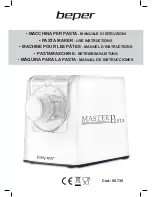
19
Exterior Cleaning
The door and cabinet may be cleaned with a mild detergent and warm water solution such as 1 oz of
dishwashing liquid mixed with 2 gallons of warm water. Do not use solvent-based or abrasive cleaners.
Use a soft sponge and rinse with clean water. Wipe with a soft clean towel to prevent water spotting.
Stainless steel can discolor when exposed to chlorine gas and should be cleaned. Clean stainless
steel with a mild detergent and warm water solution and a damp cloth. Never use abrasive
cleaning agents.
NOTICE: Stainless steel exposed to chlorine gas and moisture, such as in areas with spas
or swimming pools, may show some discoloration. Discoloration from chlorine gas is normal.
Condenser Cleaning
1.
A dirty or clogged condenser prevents proper airflow, reduces ice making capacity, and
causes higher than recommended operating temperatures that may lead to component failure.
Have the condenser cleaned at least once every six months.
2.
Unplug the ice maker or disconnect power.
3.
Remove the 2 screws at the bottom of the front cover. Grasp the lower edge of the front cover
at the right and left sides, raise it a little and then pull down.
NOTE: Do not use too much force, as the wire leads connected to the power switch can be
inadvertently disconnected.
4.
Locate the condenser surface.
Condenser surface
5.
Remove dirt and lint from the condenser fins and the unit compartment with a brush
attachment on a vacuum cleaner.
6.
Reassemble the front cover.
7.
Plug in the ice maker or reconnect power.
DO NOT touch condenser fins. They are sharp and
can be damaged easily.
Содержание BIM70
Страница 29: ...28...













































